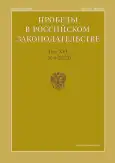The Use of Computer Technology in the Investigation of Crimes Related to Violation of Labor Protection and Safety Requirements
- Authors: Sirakanyan A.R.1
-
Affiliations:
- Surgut State University
- Issue: Vol 16, No 6 (2023)
- Pages: 236-243
- Section: Criminal Law Sciences
- URL: https://journal-vniispk.ru/2072-3164/article/view/232161
- EDN: https://elibrary.ru/FTQLLU
- ID: 232161
Cite item
Abstract
Due to the development of scientific and technological progress, computer technologies have become an integral part of life. In this regard, the development of modern methods and means of using computer technologies in the work of law enforcement agencies is an urgent issue. The purpose of this article is to highlight modern methods of investigating crimes related to occupational health and safety requirements, namely the use of computer technology.
Computer technologies are currently used by investigative agencies everywhere in the investigation of crimes, which in turn facilitates the collection, storage and use of evidence at all stages of the investigation. When investigating crimes, the investigator often attracts specialists and experts who are competent in various fields of science and technology, while the use of information technology takes the investigation to a new level.
Currently, there is a modernization of the labor protection management system at the state level. The goal of this transition is to move away from an inefficient labor protection system to a modern one based on professional risk assessment. Modern information technologies in forensic science are a priority in the investigation of crimes both in general and those related to occupational health and safety requirements.
The article provides statistical data that reflects the growing trend of convictions in cases of crimes related to occupational health and safety requirements. The article analyzes the use of computer technologies in the investigation of crimes related to occupational health and safety, suggests ways to introduce digital technologies in law enforcement practice for a comprehensive and complete support of the process of investigation and disclosure of crimes. The problems of using computer technologies in the investigation of crimes related to occupational health and safety are revealed.
The author focuses on the need to improve computer technologies that allow criminal investigation at a qualitatively new level.
Full Text
##article.viewOnOriginalSite##About the authors
Arkadiy R. Sirakanyan
Surgut State University
Author for correspondence.
Email: Sirakanyan1995@gmail.com
Scopus Author ID: 1061612
Cand.Sci.(Law), lecturer at the Department of Criminal Law and Procedure
Russian Federation, SurgutReferences
- Gavrilin Yu.V., Pobedkin A.V. Collecting evidence in the form of information on electronic media in criminal proceedings in Russia: it is necessary to improve the procedural form. Moscow: Akademija MVD Rossii, 2018. P. 106-112. (in Russ.).
- Mulenkov D. V., Lazarenko O. N. The use of digital technical means of fixation in police activities // Bulletin of the Moscow University of the Ministry of Internal Affairs of Russia, 2014. - P. 120-123. https://cyberleninka.ru/article/n/primenenie-tsifrovyh-tehnicheskih-sredstv-fiksatsii-v-politseyskoy-deyatelnosti.
- Rossinskaya E.R., Galyashina E.I. Handbook of a judge: forensic examination. Moscow: Prospect, 2011. 464 p.
- Zuev S.V. Fundamentals of the theory of electronic evidence. - Moscow: Jurlitinform, 2019. 383 p.
- Platonov V.A. Use of information technologies in the disclosure and investigation of crimes // Problems of modern science and education. - No. 24 (106), 2017. - P. 51-55.
- Tikhonova G.I., Churanova A.N. Long-term analysis of the peculiarities of accounting for industrial accidents in Russia // Demographic review. - 2019. No. 2. - P. 142-144.
- Garanin M.A., Zavyalov A.M., Dementyeva Yu.V. Correlation study of the influence of the causes of accidents on the statistical indicators of industrial injuries // Izvestia: magazine - St. Petersburg: Petersburg University of Railways, 2017. No. 3. - P. 109–120.
- Ekisheva S.V. Problems of using forensic reconstruction when examining the scene. Bulletin of TulSU. Economic and legal sciences. Issue 2. Part 2. Legal sciences. - Tula: Publishing house of TulSU, 2014. - P. 161-165.
- Yarovenko V.V., Yarovenko T.V. Application of digital photography in forensic science. Scholars’Press. 2015., P. 125-129.
- Rostovtsev A.V. Features of the use of digital photography in the production of investigative actions // Bulletin of the Moscow University of the Ministry of Internal Affairs of Russia, Vol. 9. - M., 2015. P. 114-116.
- Tutynin I.B., Koval S.N. On the use of digital photography in criminal proceedings // Forensic expert. 2006. No. 4. - P. 10-14.
- Kholopov A.V. The use of digital technologies for fixing audiovisual information in criminal proceedings: textbook. allowance. - St. Petersburg: St. Petersburg Law Institute (branch) of the Academy of the Prosecutor General's Office of the Russian Federation, 2010. - P. 67-71.
- Sazhaev A.M., Mulenkov D.V. Applied aspects of using digital means of fixation in investigative actions // Bulletin of the Novosibirsk State University. Series: Right. - 2014.T. 10, Iss. 2. - P. 142-147.
Supplementary files








